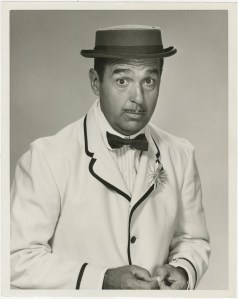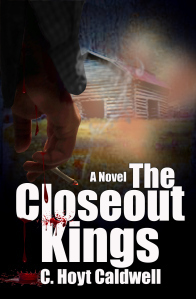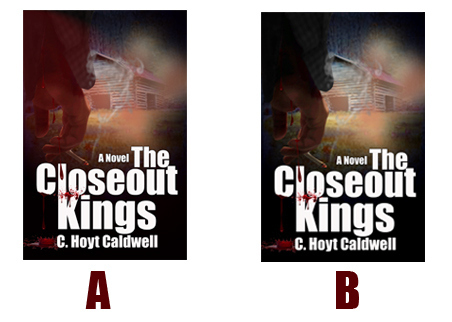R.W. Ridley's Blog, page 15
March 27, 2014
Why am I reading with a southern accent?

Tennessee Ernie Ford: “It was a dark and stormy night, y’all.”
If you’re familiar with Bad Way Out, you know that the grammar of the narrator, ER Percy, is horrible. He’s a hillbilly with no use for fancy talk. So it’s understandable that you read that book (internally or aloud) with a thick southern drawl (as the extremely talented narrator Mr. Nate Daniels did in the audiobook version).
The Closeout Kings is told using a third person omniscient narrator. All the characters are decidedly hillbilly, but the narration is a simple, straight read. So why then am I reading it with a southern accent? It doesn’t make sense to me, but every time I pick up a couple of pages and read it I become Tennessee Ernie Ford.
I may have to record a reading and post it to totally humiliate myself. Maybe then I’ll drop the dang twang and start reading it like a normal person.


March 25, 2014
The metaphysical wackiness of writing

Based on all the feedback on Facebook, here, and in the non-internet world, this looks like the winning cover.
As I announced yesterday, the first draft of C. Hoyt Caldwell’s latest book is… well, in the books. It’s done. Finished. I put a literal and figurative period at the end of it and shut it down, but only for a week or two while I decompress and gain some perspective.
The book, The Closeout Kings, focuses on a female deputy and some backwoods hit men for a hillbilly crime family. Without giving away too much information, they discover a human trafficking ring in their mountains and set out to do something about it.
As I wrote this book, I would frequently step away from it because I thought it was either too unbelievable, or because it was just too depressing to think about all the time. Every time I would take a break, the issue of human trafficking would rear its ugly head in a news story on radio or TV. It was almost like this story was chasing me down.
Last night before I went off to bed, I decided to watch Letterman for a laugh. Much to my surprise Jimmy Carter was his guest and he was talking about… human trafficking. I couldn’t believe what I was hearing. I had just wrapped up my backwoods tale of young girls being abducted and sold for profit, and here was the former leader of the free world saying it’s the worst humanitarian issue we are facing today.
This happens to me frequently when I write, and I have no explanation for it. Elements of a story will just pop up in the real world and give me a little nudge, a reminder that my characters are anxiously waiting for to me get on with it and finish. This go around I even got the flu, and it prevented me from writing for about two weeks. My head hurt too badly to form a coherent thought. During the worst part of the flu, I constantly smelled cigarettes. We don’t smoke in our family. I’ve never seen any of our neighbors smoke. Who does smoke? Step Crawford, one of the hit men in my story. Every time I smelled the burning menthol, I could imagine him standing next to me in disgust because I had let something as silly as the flu keep me from telling his story.
Well, it’s done now, Step. You can stop blowing smoke in my face.
Here’s Letterman’s full interview with Jimmy Carter last night. The human trafficking bit starts at about the 10 minute mark. I was surprised to discover that Atlanta has become an important hub of the modern slavery trade:


March 24, 2014
BOOM! The first draft of The Closeout Kings is done!
I just typed “The End” on the first draft of C. Hoyt Caldwell’s next book, The Closeout Kings! And, it is such relief! This one has been hard because of the subject matter. Trying to make a story about human trafficking enjoyable is as hard as it sounds. Is it any good? No. Not at this stage. This is the first draft. First drafts are normally dreadful. I have some rewriting to do, but the story officially has a beginning, middle, and END!
You’ll notice two things about this post. One, I called the book The Little Deputy and the Closeout Kings in a previous post. The little deputy has been pulled from the title. Not because she’s less important than the closeout kings, but because graphically I couldn’t pull off the long title when it came to designing a cover. Plus, The Little Deputy and the Closeout Kings sounds a little like a children’s book. It just doesn’t fit the genre.
The other thing that you’ll notice is that I’m talking about C. Hoyt Caldwell on my R.W. Ridley blog when in the past I said I wouldn’t unless something big happened. Well, completing a first draft is big so there. Stop judging me. There’s a possibility that I may rescind that rule anyway. I haven’t made a final decision yet, but I am leaning that way.
Now for the fun part. I created a couple of cover options for this book, and posted them on Facebook. I was stunned and pleased by the great response I got from my Facebook Friends. They gave me some really good feedback and based on that I’m down to two possibilities. Take a look and let me know which one you like better. I’ve made them about the size they’d be on an online retailer’s website because that’s where about 99% of my sales come from.

Do you like cover A or cover B?


This may be the greatest advertising… event I’ve ever seen.
There’s no other way to describe this other than an event. Think of the absolute fun these people had. Pepsi may cause diabetes and eventually kill you, but kudos to them for this bus shelter ad!


March 22, 2014
The scariest 2:42 you’ll spend today or tomorrow or the next day
This short film by David F. Sandberg had me on the edge of my office chair. It’s called Lights Out, and my advice is to keep the lights on while watching this… Actually just keep them on. Never, ever turn them off again.
Lights Out – Who’s There Film Challenge (2013) from David F. Sandberg on Vimeo.


March 17, 2014
What book inspired a Kurt Cobain song?
March 16, 2014
Here’s why authors should never get upset about a bad review
You’re so wrong, Book Riot! The Old Man and The Sea is a “MUST READ”!
Basically, the premise of this post is that having an opinion doesn’t make that opinion valid. Case in point: Book Riot, a fun little e-zine that covers all things books, started a “What Not To Read” book club for their Twitter Fiction Festival, and they included The Old Man and The Sea on the list. The Old Man and The FRIGGIN’ Sea! Are you kidding me? The book is a classic for a reason. It’s a seminal piece of literature, one that I include in my top 10 all-time favorite reads. What is wrong with these people? Have they no literary soul?
Here’s the deal. Book Riot is worth adding to your list of bookish websites to visit on a regular basis, but even they can get it horribly and embarrassingly wrong. Remember that next time you get a bad review. Don’t take it personally. If someone can be wrong about Hemingway, they can be wrong about your book too. We don’t all like the same thing.
BTW – Back in my schooling days, I was taught that The Old Man and The Sea wasn’t a book, but a short story. Has our text message driven society changed the definition of what is and is not a book?


March 15, 2014
It doesn’t matter what you call me

My clown selfie
Every six months or so someone on the traditional side of the publishing fence feels the need to blast the internet with their opinion on the unsettling trend of self-published authors flooding the marketplace with material that hasn’t been vetted by the increasingly irrelevant gatekeepers of the industry. The fact that anyone with a computer can publish a book sickens them, and they bark out their dismay until their throats get sore, and they annoy the holy hell out of everybody in the process. We get it. You’re upset. Move on. There is nothing new you can say. Your point has been made… repeatedly, and uttering another word about it is completely unnecessary.
The latest grumbler is Michael Kozlowski, Editor in Chief of Good E-Reader. He is so miffed that he is even offended self-published authors are allowed to call themselves authors. I’m guessing he wants self-published authors to wear a scarlet letter… only not an “A”. He suggests that self-published works should be segregated from those published by what he calls “professional” authors. His logic here is that it’s unfair to consumers to subject them to a plethora of inferior works on an e-tailer’s website. They should be given a clear path to the deserving works of traditionally published authors.
Kozlowski’s argument would be valid if not for the fact that by his own definition Snooki is a “professional” author, along with Pamela Anderson, Britney Spears, John Travolta, and the list goes on. Bad writing abounds amongst the offerings of traditional publishers and self-publishers. To suggest that a bad writer deserves to be called an author because he or she has a contract with a traditional publishing house while another one doesn’t because he or she self-published is more than a bit short sided. It’s an elitist-laden load of pap.
Here’s the good news. Good writing can be found in the indie world just as plentifully as it can be found in the traditional world, maybe even more so. Self-published authors are more apt to take risks and bring readers something new, while “professional” authors often play it safe and follow formulaic writing not because they want to, but because they’re being paid to. I ask you which has the potential to bring more value to the literary world.
I’m a writer first and foremost. I’m devoted to the art of fiction. Whether or not you call me an author matters not to me. Call me a hack or Bobo the typing clown for all I care.
Writer out.


March 14, 2014
When a bestselling author isn’t really a bestselling author

Or not!
Do you have a book you want to appear in the top ten of a “prestigious” bestsellers list? Yes? Okay, next question. Do you have $85,000 to pay a company called ResultSource to manipulate your book sales for a day? The sudden spike in sales will flash on the radar of bestselling lists and wham, bam, call it a scam, your book is listed as a bestseller. Now, your sales will drop precipitously after you’ve reached such dramatic literary heights, but that doesn’t matter. You can forever call yourself a bestselling author.
According to an article in the Wall Street Journal, here’s how it works. ResultSource will use a portion of the $85K you paid, and “arrange the purchase of a quantity of books in such a way that they (are) counted toward national best-seller lists.”
In other words, enough books (2500-3000) will be purchased by a stable of buyers on a certain day to give you a sales spike. ResultSource will reimburse those buyers for their purchase, and, I imagine, kick in a little “commission” for their efforts. Now, part of this is conjecture on my part because ResultSource has never really revealed how their formula works, but common sense sheds a little light on the darker aspects of this fraud.
The article only addresses this tactic being used for business books, but I’m willing to bet that other categories and genres are afflicted by this dishonest practice. Authors do not reap riches for their investment. They merely use it to acquire the title of “Bestselling Author” to apply to their website, business cards, and Christmas newsletter for family and friends. They may get a speaking engagement or two out of the deal, and a front of the line pass at Starbucks, but other than that this truly has a horrific ROI (Return On Investment). You would think business book authors would know better.
The truly astonishing thing that one learns from this article is how few books you actually have to sell to appear in the top ten bestsellers lists from The New York Times to The Business Journal.
Authors who have used ResultSource have discovered that there is no lasting effect from their enormous investment. You think? They create artificial demand for a brief period of time. The key to a books popularity and sales isn’t the people who buy it. It’s the people who read it. ResultSource isn’t finding readers for authors. They’re finding buyers who will never crack it open. They’ll never fall in love with it or find anything of value in it. They’ll never rush to Facebook or Twitter to tell their friends and followers about it. They’ll never call up their BFF or mom and insist they read this great new book they discovered.
You can manipulate a bestseller list for a brief moment in time, but you can’t manipulate readers.
Arm outstretched. Microphone dropped.


March 11, 2014
Other authors should stop telling JK Rowling to stop writing

Lynn Shepherd may be wrong, but I still need her to succeed as an author.
Let’s get the confessions out of the way. I read 100 pages of the first Harry Potter book, put it down, and never picked it up again. It wasn’t bad writing. It just wasn’t for me. I prefer stories with a little more grit. Unlike other bestsellers in recent years, I do understand why the HP series was a tremendous success. Author JK Rowling is a masterful teller of fantasy tales, and she writes characters with which you can connect. I applaud her for getting not just one generation interested in books, but several generations from the UK to America to Zimbabwe and beyond. She carried the entire publishing industry on her back for a few years, and for that alone she has my respect.
Confession number two, I don’t know who Lynn Shepherd is, and I’ve never read a single word of her books. But, her recent comments concerning JK Rowling have put her on my radar. She’s a novelist in the UK who wrote a piece for the Huffington Post urging JK Rowling to stop writing. Shepherd’s main objection is that by publishing books that don’t really deserve the attention they’re getting, Rowling is making it impossible for other authors to get any attention for they’re much more deserving books.
In Shepherd’s own words:
I didn’t much mind Rowling when she was Pottering about. I’ve never read a word (or seen a minute) so I can’t comment on whether the books were good, bad or indifferent. I did think it a shame that adults were reading them (rather than just reading them to their children, which is another thing altogether), mainly because there’s so many other books out there that are surely more stimulating for grown-up minds. But, then again, any reading is better than no reading, right? But The Casual Vacancy changed all that.
It wasn’t just that the hype was drearily excessive, or that (by all accounts) the novel was no masterpiece and yet sold by the hundredweight, it was the way it crowded out everything else, however good, however worthwhile. That book sucked the oxygen from the entire publishing and reading atmosphere. And I chose that analogy quite deliberately, because I think that sort of monopoly can make it next to impossible for anything else to survive, let alone thrive. Publishing a book is hard enough at the best of times, especially in an industry already far too fixated with Big Names and Sure Things, but what can an ordinary author do, up against such a Golgomath?
Shepherd’s logic is flawed. She assumes that a book is wholly fulfilling, that readers will devour its contents and satisfy their need to escape into the world of fiction for the entirety of their lives. In fact, the opposite is true. When a reader falls in love with a book, it ignites a passion for reading that benefits every author. A reader develops a need for fiction that becomes as addictive as alcohol or crack only without the occasional blackouts and poorly made coitus-centered decisions.
Rowling doesn’t suck up all the oxygen in the publishing industry. If anything, she makes it an oxygen-rich environment. We authors of lesser note need JK Rowling to publish more. We need her to expand her appeal across every demographic.
A note to Lynn Shepherd: Literary taste can’t be explained, and shouldn’t be attacked. I love the works of Erskine Caldwell. To me, he is flawless as a writer. Yet, I’ve read scathing reviews of his books. Suggesting that JK Rowling is a second-rate writer is an untenable position. Just because you don’t like her books doesn’t make her writing less than deserving. Are there books that have reached an iconic status that I find unreadable and abhorrent? Absolutely. Does their popularity ruin it for the rest of us? Not in the least. Readers of those books will hunger for more to read, and their tastes will grow. Great writing and storytelling will always win out in the end. You and I may disagree on the nature of publishing and the public’s consumption of books, but that doesn’t mean I want you to fail. On the contrary, I need you to succeed. You have my sincerest hope that you reach bestseller status and bring millions more readers into the fold.
UPDATE: Ouch! I just read a few of the “readers’” reviews on Amazon of Shepherd’s latest book, and she is taking some big hits for her piece in HuffPo. I put “readers’” in quotes because most of those giving the book such poor reviews admit to not having read the book.
Shame on those reviewers. They object to her judging another author’s work she hasn’t read and then they turn around and do the same thing to her. JK Rowling will survive Shepherd’s comments unscathed. They needn’t compromise their own integrity to defend her.







